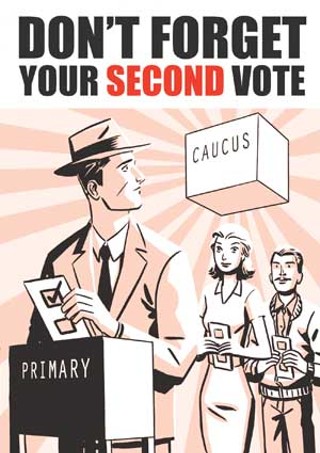Make Your Vote Count – Twice!
A primer on Democratic precinct conventions
By Lee Nichols, Fri., Feb. 29, 2008

We've all heard the ballot-stuffing joke: "Vote early; vote often." Well, in this election, it's no joke: You should vote twice. In fact, it's legal, and it's encouraged – at least if you're a Democrat.
The process will require some explanation.
No, don't cast a ballot twice. What election officials and candidates want you to do – in fact, they're pleading for it – is to show up at your precinct convention at 7:15pm on March 4, after the polls close (but in this high-turnout election, the convention can't begin until the last voter in line has voted). That is where you will cast your "second vote." If you don't, you're giving up part of your influence on the Democratic presidential nomination. And yes, you should report to your precinct that night, whether you voted early or on election day.
You might be vaguely aware of these precinct meetings but never actually participated in one. In recent elections, they haven't been very important, as the presidential nominations have been wrapped up by the time the primaries come to Texas. But this year, Texas is at the epicenter of the fight for delegates between Democratic candidates Sen. Hillary Clinton and Sen. Barack Obama.
Securing either major party's nomination comes down to which candidate gets the most delegates at the national conventions. For Democrats, that delegate struggle has many parts. There are the "superdelegates" – important party figures, such as elected officials and party officers, who can pledge for whichever candidate they choose. Then there are regular, or "pledged," delegates, who are essentially divided among the candidates according to the results of the state primary elections and caucuses. Texas will send 228 delegates to the national convention – 193 pledged and 35 superdelegates.
For purposes of this discussion, forget about the supers, and consider, under the Texas mixed primary-caucus system, the other 193. Of those, 126 will be apportioned roughly according to the popular vote. (I say "roughly," because actually they're apportioned according to the popular vote in each of Texas' 31 Senate districts – the delegate count for each of which was determined according to voter turnout in the last two general elections. So if a particular Senate district had low turnout in 2004 but high turnout in this primary, they are going to get shortchanged a bit this time around when it comes time to awarding delegates. That could be another article unto itself.) But the process of deciding the other 67 will begin at the precinct conventions – and that's where you come in. (The Republicans have no such weirdness – all of their precinct delegates will be pledged according to the popular vote, and McCain is virtually a lock anyway. Texas Republicans do convene, however, to select delegates and to propose policy resolutions to the state GOP convention – and are asking their voters to convene at 7:30pm.) The Democratic delegates selected on March 4 at the precinct level will attend the March 29 county convention, where they will in turn select delegates to the June 6-7 state convention (also in Austin this year), and those delegates will then select delegates to the Aug. 25-28 national convention, to be held in Denver.
What It Means
Now, if you aren't picky about whether the candidate is Obama or Clinton, there isn't much need for you to attend your precinct convention. But if you're fiercely committed to Barack or Hillary, then you need to represent – otherwise, the other candidate's supporters might fill your precinct meeting and swing convention-selected delegates the other way. For example, let's say you live in a heavily pro-Obama neighborhood. You'd want the delegates sent to the county convention from your precinct to reflect that, right? But if Clinton supporters mobilize and get to that caucus, and Obama supporters don't, then Obama won't come away with any representation from your precinct at the conventions that decide those 67 delegates.
In this year's race, that could be crucial. Thus far – combining pledged delegates from the states that have already voted or caucused with superdelegates that have already committed – Obama has secured 1,319 national delegates, and Clinton is right behind with 1,250, according to CNN. The first to reach 2,025 wins the nomination.
That mixed system may sound kind of screwy, but Texas Democratic Party spokesman Hector Nieto defends it as empowering truly committed party activists: "It's kind of putting an emphasis on your vote, or an exclamation mark on your vote, where you have the opportunity to be able to go vote in the primary, and then if you want to continue to support your candidate, you have the ability to go to the precinct convention. This is just another way to be part of the process and get involved in the grassroots level." But might this process tip the nomination to a candidate that loses the popular vote? "No," Nieto said, but then he backtracked and said: "Obviously that's a possibility, but it forces campaigns to be more involved in Texas and forces them to communicate with Texans. That's what we want – we want our candidates to communicate with all our voters and give an opportunity to our voters to hear directly from them."
How It Works
So if you decide to go, here's what to expect: First, you'll sign in and indicate which candidate you support. This is not a secret ballot. Be on time! You won't get a do-over if you're late and miss it. You'll all then elect a precinct chair and secretary. The chair will then announce the number of delegates that your precinct will send to the county convention, the percentage of people in the room who support each candidate, and, based on that, the number of delegates that the supporters of each candidate are entitled to elect. (You can, if you wish, sign for your candidate and leave – or stay and help select actual delegates.)
If your favorite candidate doesn't meet the minimum "threshold" to warrant a delegate, then you may elect to caucus with supporters of your second-favorite candidate. (Most likely your precinct will simply break into a Clinton group and an Obama group, so you Kucinich die-hards will have to choose the lesser evil.) Once you've broken into groups – "candidate caucuses" – you'll nominate and vote on people within your group to serve as delegates or alternates to the county convention. Those present can also propose and vote on resolutions to forward to the county convention for consideration in the party platform.
Similar processes will then be repeated at the county and state levels – if you're willing to be a delegate and you make it through these steps, guess what: You could find yourself in Denver Aug. 25-28, at the Democratic National Convention.
That's as much detail as I'm willing to go into in this space. If you need more, go to www.txdemocrats.org and click on the button labeled "Precinct Convention Information."
Now get out there and vote. And vote.
Thanks to the folks over at Burnt Orange Report (www.burntorangereport.com), who helped simplify this stuff.
If you're a Travis Co. resident needing to find your precinct polling place, which is also where your precinct convention will be held, call 238-VOTE or see www.co.travis.tx.us/county_clerk/election/20080304/polls.asp.
Texas' Delegates
Texas gets 228 delegates to the Democratic National Convention – more than one-tenth of the total needed to secure the presidential nomination. But only 126 of those delegates will be decided in the Democratic primary election March 4.
Most of the rest will be chosen in a process few people know about, which begins election night after the sun goes down and the polling places close ...
35 Unpledged superdelegates (party officials and members of Congress), who can vote however they want
126 Pledged senatorial district delegates, divided according to the popular vote in each of the 31 Texas Senate districts
42 Pledged at-large delegates (chosen via the precinct/county/state convention process)
25 Pledged party officials and officeholders (chosen at the state convention, but also via the precinct/county/state convention process)
228 Total Texas delegates
Got something to say on the subject? Send a letter to the editor.








